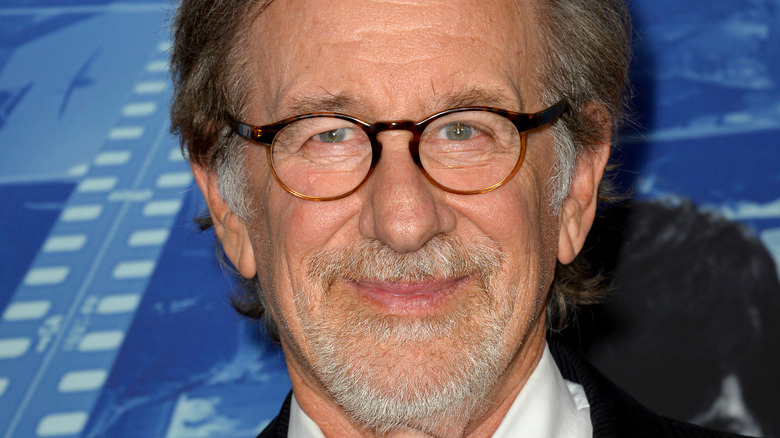
Most filmmakers are lucky if they end their career with just one classic on their resume, but Steven Spielberg has made upwards of a dozen. Spielberg has a versatility that is unparalleled among his contemporaries. Whether it's adventure, drama, comedy, historical period piece, science fiction, fantasy, or animation, he's done it, and likely done it well.
He's also one of the most prolific working filmmakers with 32 feature films released. Taking time and care to select each project, Spielberg has often attached himself to films that he didn't end up directing. Whether he decided the story wasn't for him, saw the project get stuck in development hell, couldn't attain the rights, or passed the script to another filmmaker, Spielberg has been involved with many intriguing projects that, for whatever reason, didn't see the light of day. Sometimes a film just wasn't meant to be, but we still wish we could've seen these canceled Spielberg projects.
A George Gershwin Biopic
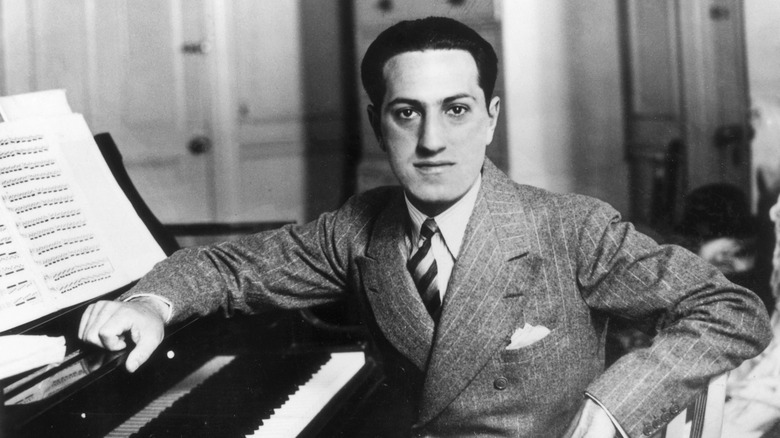
Spielberg is one of the quintessential American filmmakers and frequently directs biographical films about famous national figures. Spielberg had planned to spotlight one of the most beloved composers and pianists of all-time with a biopic about composer George Gershwin. Gershwin's famous songs include "Rhapsody in Blue," "An American in Paris," "Shall We Dance," "Funny Face," and "Girl Crazy," among dozens of other classics.
Spielberg cast Zachary Quinto in the lead role following Quinto's reimagining of Spock in 2009's "Star Trek." Although production was set to begin in April 2010, the project was never completed. Spielberg mentioned during the press tour for "Lincoln" that he was still interested in the story, but has been quiet about it ever since. Currently "Sing Street" director John Carney is planning his own Gershwin musical titled "Fascinating Rhythm," with Spielberg's friend Martin Scorsese producing.
Gershwin has a fascinating life story that would've surely benefited from Spielberg's sensitive approach. Gershwin struggled to overcome anti-Semetic discrimination throughout his childhood and changed his surname as a result, something can Spielberg relate to. Spielberg has mentioned that severe bullying over his Jewish heritage haunted his childhood, and has explored anti-Semetic prejudice in projects like "Munich" and "Schindler's List." Quinto is a terrific actor and looks quite a bit like Gershwin, too. Outside of Spock, he's given great performances in ensemble films "Margin Call," "High Flying Bird," and "The Boys in the Band," but the lead part in a Spielberg movie would have been a step up.
The Oldboy Remake
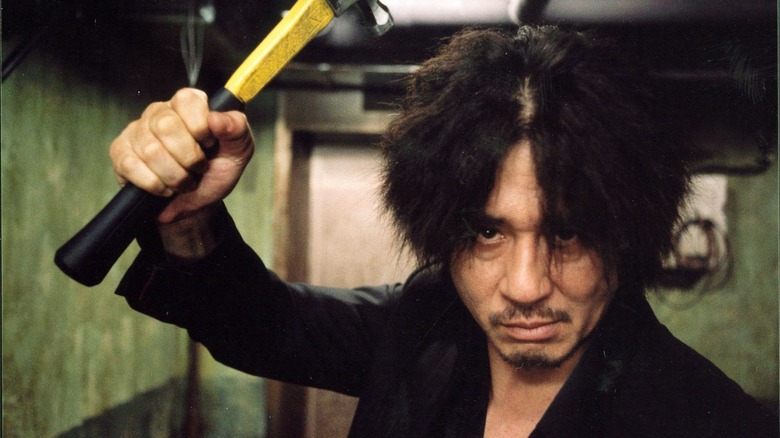
The South-Korean neo-noir thriller "Oldboy" was the rare international film that became a crossover success in the United States. Directed by Park Chan-wook, the revenge saga follows egocentric businessman Oh Dae-su as he's shockingly kidnapped and held captive in one room for 15 years without knowing why he's been imprisoned. Training himself to become a lethal fighting machine, Dae-su eventually breaks out and embarks on an epic mission of vengeance. "Oldboy" ends with a shockingly dark twist that subverts traditional revenge fantasies.
Given the critical acclaim for the film, American studios were keen to produce an English-language remake. Spielberg became interested in a proposed retooling that would have starred Will Smith, and commissioned "I Am Legend" screenwriter Mark Protosevich to pen the adaptation. Spielberg eventually pulled out of the project for unknown reasons. Eventually, Spielberg's friend Spike Lee claimed the rights to Protosevich's script and directed a version that starred Josh Brolin, which was released in 2013.
Spielberg's version of "Oldboy" would have been fascinating, as although Spielberg frequently explores disturbing material, the events in "Oldboy" are sadistic in a way his films never have been. Spielberg has never directed Will Smith, and it would be interesting to see the charismatic actor take on such a disturbed character. The original "Oldboy" was hailed for its inventive action sequences, particularly the one-shot hallway fight scene, but Spielberg has created some of the most inventive set pieces of all-time; it would've been thrilling to see his version.
Indiana Jones And The Saucer Men From Mars
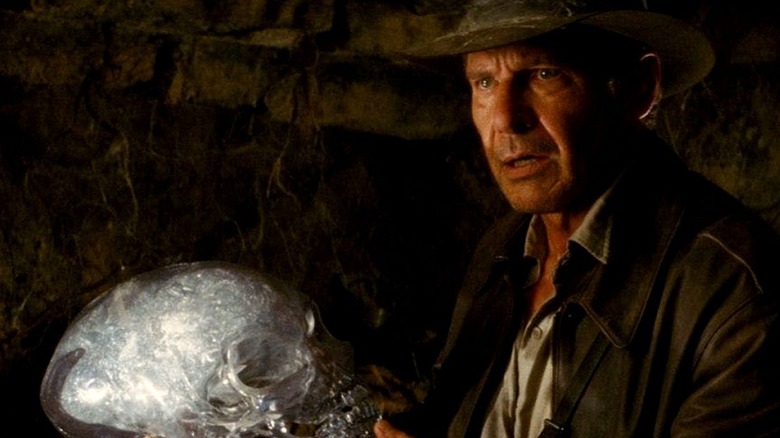
The development of a fourth entry in the "Indiana Jones" franchise was a lengthy one. Beginning in the early '90s, Spielberg, Harrison Ford, and George Lucas sparred over the direction to take the series, with Lucas pushing for the film to be a science-fiction B-movie. Lucas theorized that since the adventure serials of the '30s and '40s had inspired the original trilogy, it would be logical for the next installment to resemble '50s alien invasion movies.Eventually, Lucas commissioned "Die Hard" and "The Fugitive" screenwriter Jeb Stuart to write a sci-fi slanted draft titled "Indiana Jones and the Saucer Men from Mars." Stuart's version followed Indy as he embarked on a quest to find a UFO power source alongside a feisty linguist named Elaine McGregor. The story contains many of the same elements as the movie that was eventually made, "Kingdom of the Crystal Skull," including alien artifacts scattered throughout ancient civilizations and Indy settling down and getting married. In Stuart's version, the wedding is attended by Indy's companions, including his father Henry Jones Sr., Short Round, Sallah, Marion Ravenwood, and Willie Scott.Fans were mixed on "Kingdom of the Crystal Skull," but "Saucer Men from Mars" might have been an interesting tribute to classic sci-fi featuring Ford in his prime. After all, Spielberg later proved he could reimagine '50s B-movies with his brilliant 2005 remake of "War of the Worlds."
Thank You For Your Service

Spielberg has frequently told stories about World War II, largely in honor of his father's service in the '40s. "Saving Private Ryan" is one of the greatest war movies ever made, and Spielberg also produced several World War II miniseries for HBO, including "Band of Brothers" and "The Pacific." However, a film about modern conflict would have been a new direction for Spielberg, who almost directed an adaptation of the nonfiction novel "Thank You for Your Service" by Pulitzer Prize-winning author David Finkel.
Spielberg optioned the novel as a potential reunion with Daniel Day-Lewis right after he won the Academy Award for "Lincoln." The novel chronicles the lives of three U.S. soldiers who return from Iraq and struggle to cope with post-traumatic stress disorder as they adjust to civilian life. Spielberg hired "American Sniper" screenwriter Jason Hall to write the script, and eventually agreed to let Hall make the film his directorial debut; the 2017 release starred Miles Teller.
While the final film is a respectfully earnest adaptation of the book, the material would have benefited from the emotional intensity that Spielberg generally provides. In particular, it would have been exciting to see Spielberg work with Day-Lewis to capture the story's realistic tone, as Day-Lewis is renowned for his dedication to getting inside his characters' minds and exploring their motivations. Spielberg's films frequently explore complex notions of patriotism, and seeing his take on the Iraq conflict would have been a treat.
A Martin Luther King Jr. Biopic
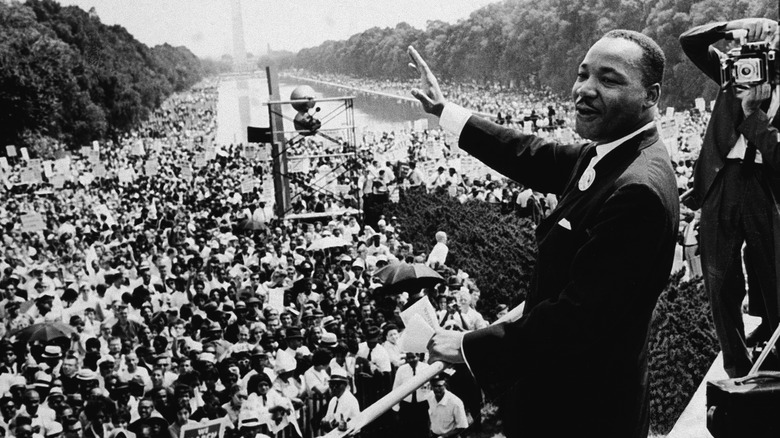
Spielberg's interest in spotlighting American heroes sometimes includes lesser-known historical figures, but he also isn't afraid to tackle the lives of people as famous as Abraham Lincoln. Interested in depicting civil rights icon Martin Luther King Jr. on screen, Spielberg obtained King's life rights from the family estate in 2009. Spielberg also owns King's public addresses, including the iconic "I have a dream speech," and planned to utilize them in a feature film. He described it as not a biopic, but instead a story about King's movement and how he utilized the teachings of Gandhi.
When the King biopic "Selma" hit theaters in 2014, it was shockingly the first major theatrical film about the activist's life. "Selma" was beloved and drew praise for David Oyelowo's sensitive, nuanced depiction of King. Oyelowo's fans include Spielberg himself -- Oyelowo revealed that a gushing Spielberg approached him about reprising the role, suggesting that the story has not left his mind.
"Selma" is a great movie, and it was appropriate that the first major cinematic depiction of Martin Luther King Jr. came from a Black filmmaker. However, King has so many accomplishments that another film could tell a different chapter of his story. Spielberg's idea to detail the growth of King's movement sounds like a riveting story that would benefit from Spielberg's attention to historical detail and his gift for bringing pathos to the big screen.
Robopocalypse
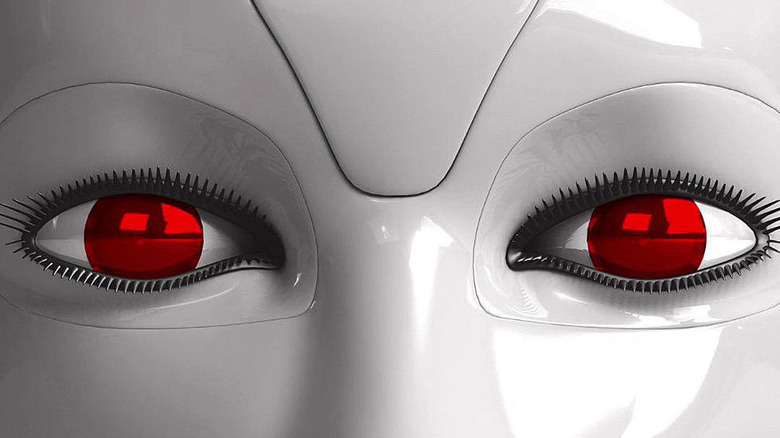
Few filmmakers have influenced science fiction as much as Spielberg. Not only has Spielberg directed some of the greatest sci-fi films of all time, but he plays in different subgenres. "Close Encounters of the Third Kind" is a meditative art film. "E.T. the Extra Terrestrial" is a heartwarming family drama. "Jurassic Park" is the quintessential summer blockbuster. "A.I. Artificial Intelligence" is a devastating exploration of the ability to love, "Minority Report" is a dystopian study of consciousness, "War of the Worlds" reimagined sci-fi B-movies for the post-9/11 era, and "Ready Player One" takes on virtual reality and digital fan culture.
Spielberg looked to develop an action-packed adventure about humanity's battle against an artificial intelligence uprising with an adaptation of David H. Wilson's popular novel "Robopocalypse" in 2010. Chris Hemsworth and Anne Hathaway signed on to star in 2012, but while Spielberg was supposedly still considering the project in 2014, Michael Bay took over as the adaptation's new director in 2018.
It would have been intriguing to see what direction Spielberg would have taken "Robopocalypse." Scripted by "Cabin in the Woods" co-writer Drew Goddard, it's possible that Spielberg had a darker concept in mind. However, he returned to popcorn entertainment with "Ready Player One" with a similar message about humanity's over-reliance on technology, so perhaps he imagined "Robopocalypse" as a summer crowd pleaser.
The Curse Of Monkey Island
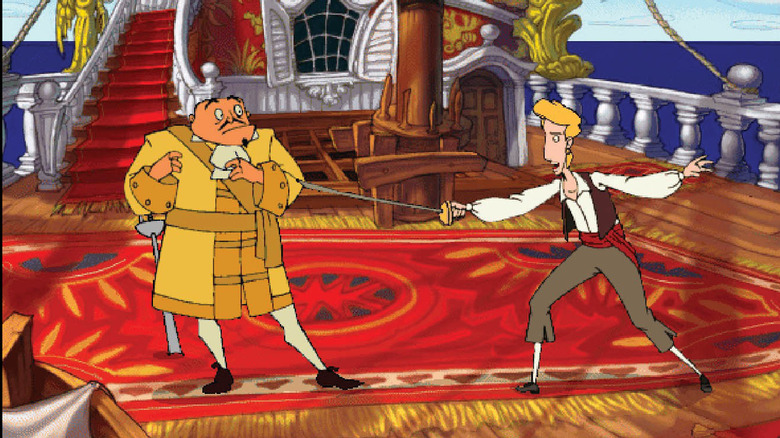
Although he's a renowned cinephile, Spielberg has been obsessed with video games since he was a child. In the '90s, Spielberg planned to adapt one of his favorite video games, "Monkey Island," for the screen. Not only would "Monkey Island" have been Spielberg's first animated film, but it would've reunited him with longtime friend George Lucas, whose video game company LucasArts produced the game series known for its cheeky, fourth-wall breaking humor. Set during the Golden Age of Piracy, "Monkey Island" follows a group of heroes who hunt for clues and battle fantasy creatures.
Screenwriters Terry Russio and Ted Elliot were set to write the adaptation, but given Lucas' commitments to "Attack of the Clones," the production was put on hold. The pair later wrote the "Pirates of the Caribbean" trilogy, which has a premise and tone similar to those of the "Monkey Island" games. After leaked concept art revealed storyboards for the planned film, some theorized that "Monkey Island" was reworked into Disney's wildly successful franchise.
Prior to "Pirates of the Caribbean," pirate movies had been unsuccessful, thanks to notorious box office bombs like "Cutthroat Island" and "Treasure Planet," so it would have been interesting to see Spielberg take a stab at the genre after "Hook." Spielberg is a technological innovator, and the prospect of him helming an animated adventure during the early days of 3D animation is intriguing; with Spielberg's influence, the medium could have gone in a very different direction.
Night Skies
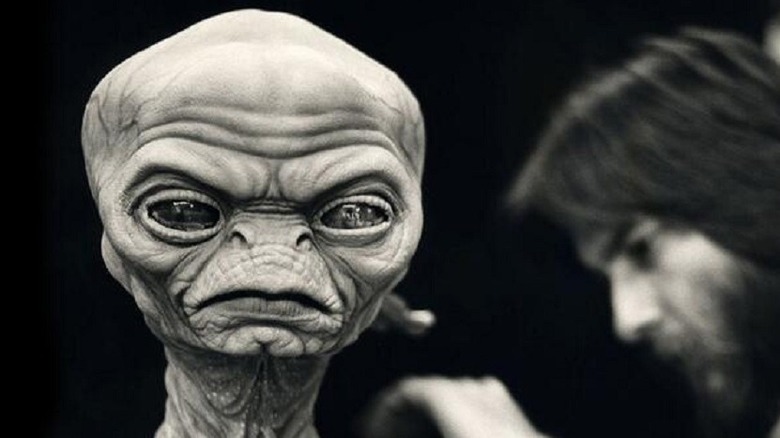
Shortly after the success of "Close Encounter of the Third Kind," Spielberg was eager to return to science fiction. Columbia Pictures wanted a sequel, but Spielberg instead began developing a terrifying sci-fi horror film called "Night Skies." Inspired by the 1955 Kelly-Hopkinsville encounter, it followed a rural Kentucky family that claimed to be visited by gremlin-like aliens. Screenwriter John Sayles wrote a draft that focused on villainous aliens that terrorize a small community, with one friendly alien named Buddy befriending the young children. The brilliant makeup artist Rick Baker designed five distinct creatures for the film.
Eventually, Spielberg latched onto the concept of a friendly alien and began developing "E.T. the Extra Terrestrial" instead. Other collaborators on "Night Skies" spun some of its concepts off into classics of their own; Joe Dante utilized the chaotic creatures in "Gremlins," and Tobe Hooper expanded the idea of a family haunted by mysterious forces in "Poltergeist," both of which Spielberg produced.
While the collapse of "Night Skies" may have paved the way for other beloved favorites, it would have been interesting to see Spielberg experiment with sci-fi body horror early in his career. Spielberg captures suspense brilliantly, and he's shown an interest in the philosophical questions that unnatural creatures spark in "Jurassic Park" and "War of the Worlds." The talented team that worked on "Night Skies" would have certainly created a film that would still be discussed today.
Blackhawk
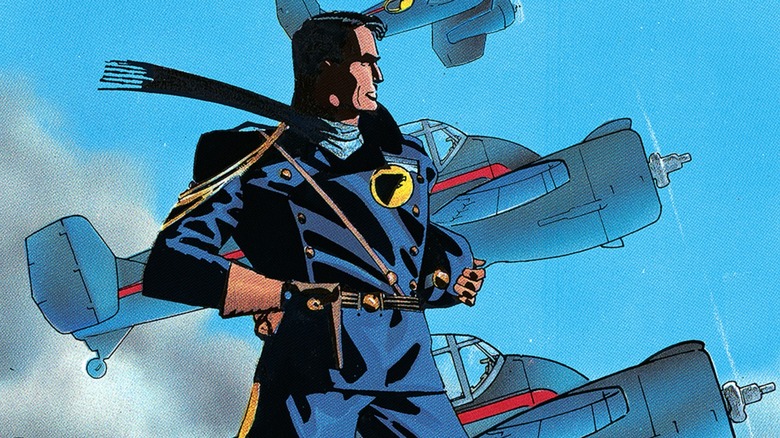
Spielberg has a longstanding interest in the DC Comics series "Blackhawk," which follows a group of World War II dogfighter pilots who embark on covert missions. The characters have existed since their first appearance in 1941's "Military Comics" #1, but they've been reinterpreted countless times, with a successful recent run in DC's New 52 relaunch. Spielberg planned a big-screen adaptation in the mid-'80s, with Dan Aykroyd poised to star as the team leader.
Spielberg hasn't lost his passion for the property, and in 2018 it was announced that he would be directing a new "Blackhawk" film in the DCEU with a script from his "Jurassic Park" and "War of the Worlds" screenwriter David Koepp. While Koepp recently confirmed that he was still writing the project, "Blackhawk" as Spielberg's next project after "West Side Story" seems unlikely, given that he's making "The Fablesmans" instead. Given the ever-fluctuating state of Spielberg's schedule and the uncertain status of the DCEU, it's unclear if Spielberg's "Blackhawk" will ever see the light of day.
A story about World War II heroes in an action-packed adventure is right up Spielberg's alley; even if he's not directing the next "Indiana Jones," it would be thrilling to see him return to the world of classic adventure serials. Koepp and Spielberg work brilliantly together, and the multinational heroes of the "Blackhawk" stories could spotlight a diverse cast and modernize some of the comic's more problematic characters. DC is going in all kinds of different directions with its films, and "Blackhawk" would fit in nicely among more traditional superhero fare.
The Grapes Of Wrath
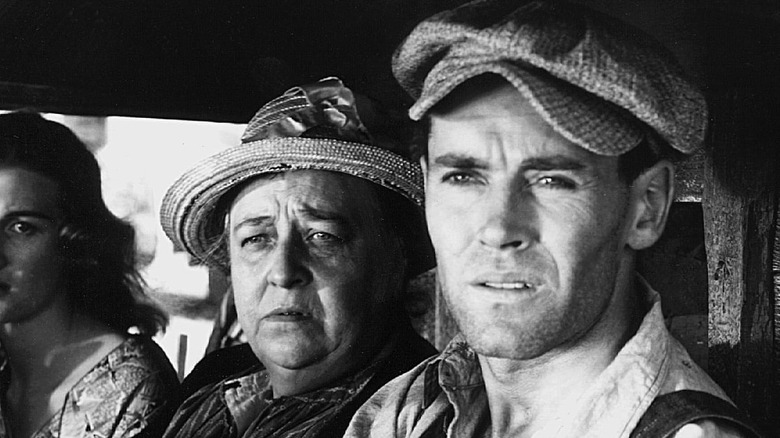
John Steinbeck's classic novel "The Grapes of Wrath" was adapted into a beloved film in 1940 by director John Ford. The Great Depression-era novel was a landmark piece of literature thanks to its realistic take on the Great Depression, told through an Oklahoma family's struggle to survive the Dust Bowl and travel alongside other farmers to California. Spielberg eyed a potential remake that could reunite him with Daniel Day-Lewis, and hired Steinbeck's lone surviving son Thomas as an executive producer. However, the rights to the adaptation are partially owned by Steinbeck's descendants, and a legal battle prevented a new version from entering into production.
It's unfortunate that Spielberg wasn't able to join the project, as he excels at both historical films and family dramas. While Ford's version is a classic, enough time has passed that a new adaptation could explore the story from a modern perspective. It would be interesting to see Spielberg take on Ford's story, as he has frequently cited Ford as a primary influence and one of his favorite filmmakers. Many of Spielberg's films, including "War Horse" and "Empire of the Sun" are very Ford-like, with their picturesque visuals and sweeping landscapes.
Henry Fonda's performance as patriarch Tom Joad is one of his definitive roles, but if there's any actor who could step into his iconic part it would be Daniel Day-Lewis. Sadly, even if the legal battle is resolved in Spielberg's favor, Day-Lewis is now retired.
Rob Liefeld's The Mark
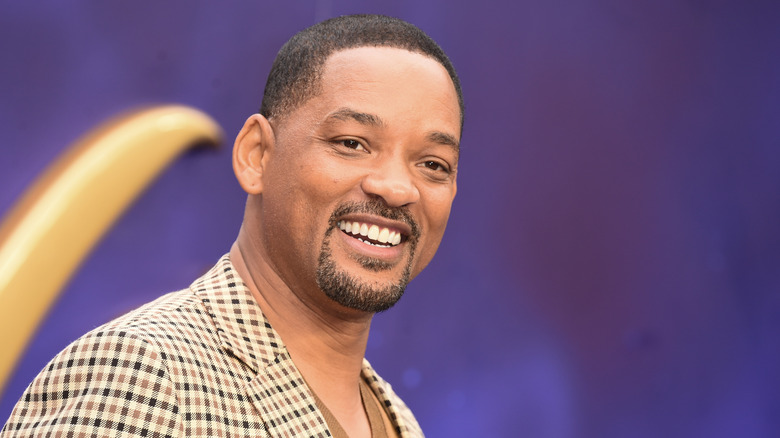
Rob Liefeld is one of the most influential comic book creators of the '90s thanks to his work on "X-Force," "The New Mutants," "Youngblood," and Deadpool, not to mention co-founding Image Comics. His extravagant character designs and bizarre storylines are divisive among comic book fans, but remain highly successful financially. Liefeld also wrote a spec script called "The Mark," and in 1998, none other than Spielberg signed on to direct, with Will Smith set to star. Smith would have played a working-class man who is granted mythological powers from the soul of a Confederate soldier and is forced to become an anti-hero. Spielberg eventually dropped out of the project due to concerns over merchandising.
Liefeld's avant-garde style is about as different from Spielberg's visual sense as you can get, so adapting Liefeld's work would have been an interesting challenge. Spielberg has yet to direct a superhero movie, and controversially argued that the popularity of comic book adaptations will fade away, similar to westerns. It would have been interesting to see if Spielberg felt differently in the late '90s, when superhero films weren't as popular, and if "The Mark" could have changed the direction of the genre.
Although he's never directed Will Smith, Spielberg aided Smith's career by telling him to star in "Men in Black," which Spielberg produced. A collaboration between the two friends is long overdue.
Read this next: 21st Century Spielberg Podcast: With 'The BFG' And 'Ready Player One', Steven Spielberg Attempted To Return To His Roots, With Mixed Results
The post 11 Spielberg projects we never saw but wish we could've appeared first on /Film.
0 Comments